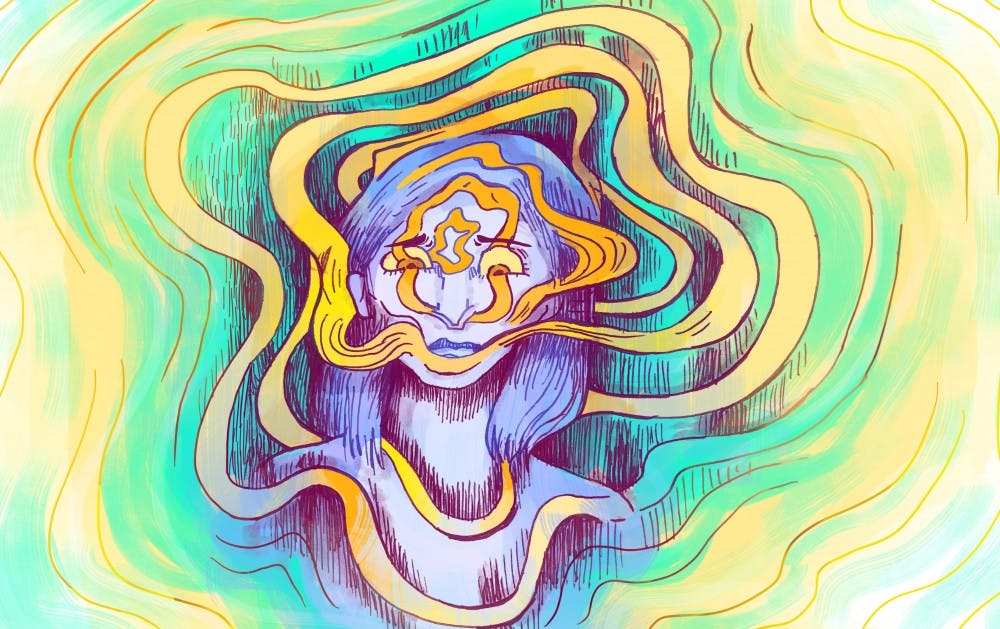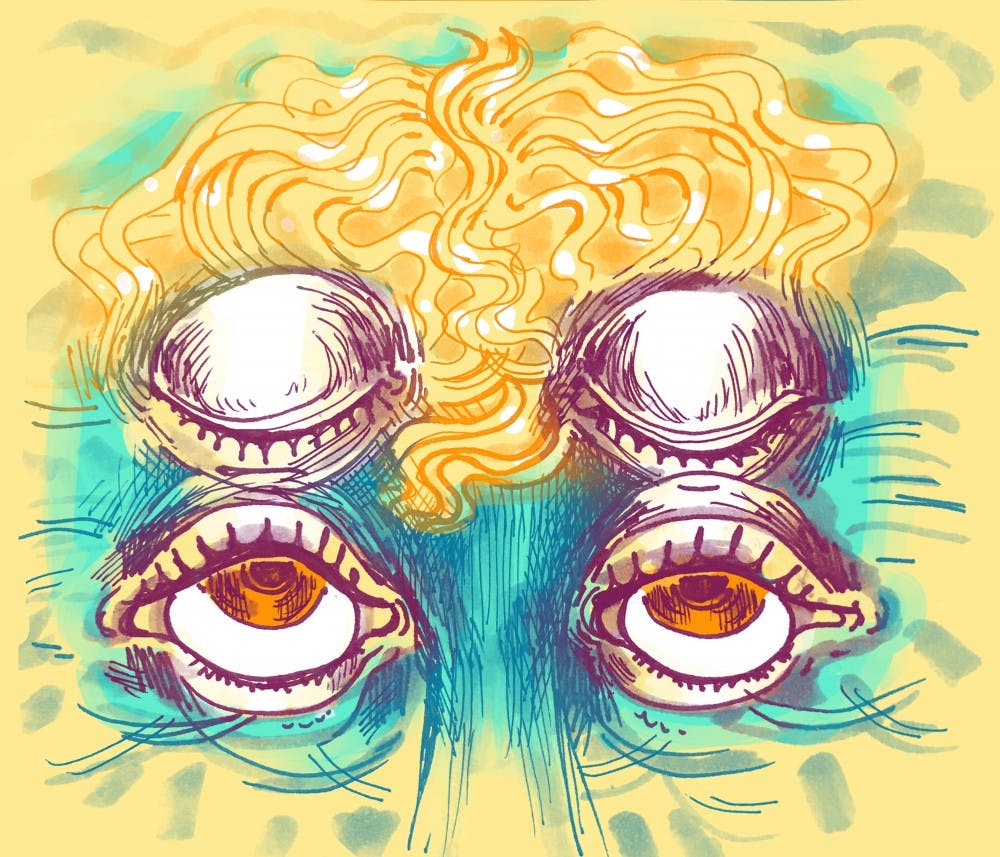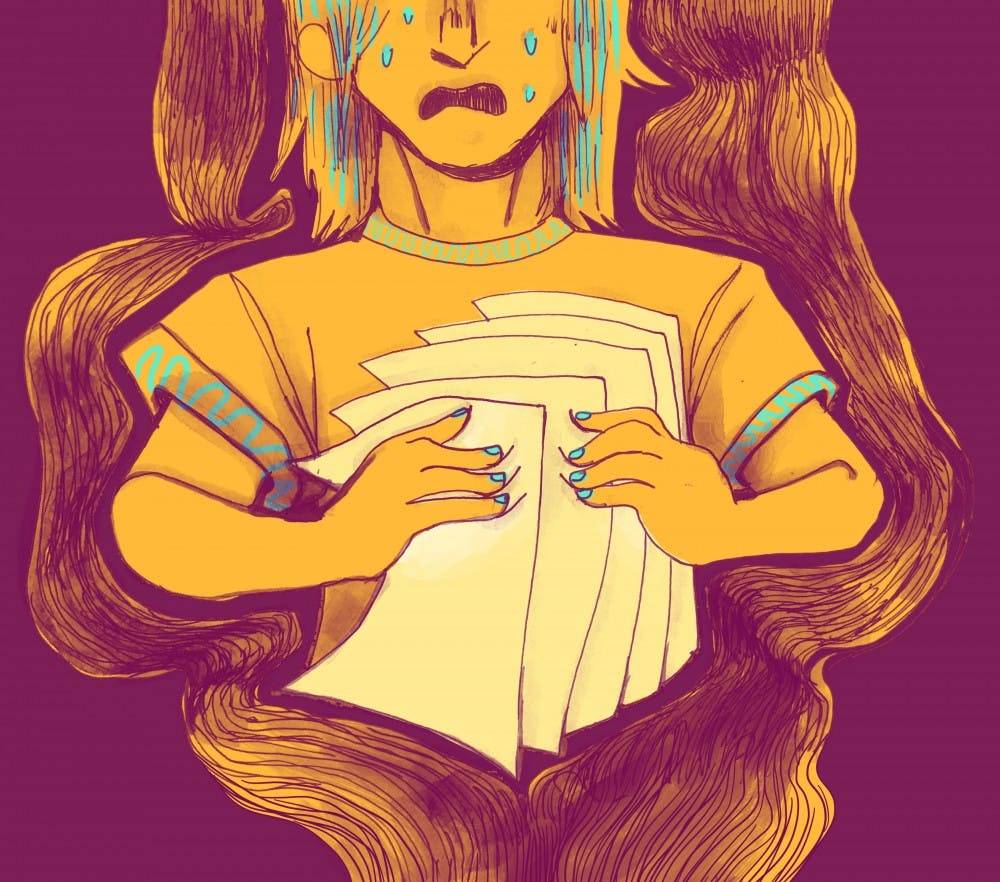I was talking to a friend in the passenger seat of their car about my lack of interest in school.
“I’m always so bored,” I said.
I can never focus — even when I want to. I’m always zoning out. It’s somehow even worse when I’m talking to professors one-on-one. It feels like I’m somewhere else.
My eyes roll back in my head and my brain is asleep. Sometimes I wonder if I even have a brain at all. It doesn’t always feel like it.
My friend said he felt the same way when he was in high school, and it only seemed to get worse for him. He said he had ADHD and that he thought I might have it too.
“Is this how you feel?” He asked, as he played me a video titled “ADHD in Girls: How to Recognize the Symptoms.” It was dead on. I cried.
I spent the next few weeks researching symptoms, taking official online tests and coming to terms with the fact that I had a mental disorder. Realizing that was the hardest part.
Maybe if someone caught it sooner, it wouldn’t have been such a difficult thing to understand. I never saw myself as anything but normal. ADHD changes everything. Now every memory I had was altered.
One of my mom’s favorite stories to tell about me is when I saw my first movie, "Finding Nemo," I was more fascinated with the multiple-stalled bathrooms than the movie itself. I had never seen bathrooms like that before. Now when she tells that story, I think, “didn’t you notice how distracted I got?”
When I took a test in fifth grade and wrote "I don’t know" for the majority of the answers. My teacher called me and my parents in to discuss how I had learned all the material, I just needed to try harder to remember it. Now I think, “why didn’t she see I was trying my hardest?”
When I was certain I had it, I called my mom. She didn’t get it.
“ADHD? Why do you think you have that? You’re not hyper.”
It took a while to explain the concept of invisible hyperactivity. I’m not outwardly jumpy, but most girls aren’t. I notice every detail in life in my head. In a crowded room, my eyes dart around every time a stranger makes the slightest movement. My brain has four thoughts before I can process one, and suddenly I’m thinking about Big Bird even though we were just talking about astronomy.
Once it finally clicked, I made an appointment with my general practitioner.
I don’t know why I expected it to go well. Years earlier, I saw the same doctor because I thought I might have an anxiety disorder. She ignored it and said I could try therapy if I wanted. So I did, but the therapist she recommended made things so much worse.
I brought the tests I filled out online, the research I found that noted its differences in women, and explained to her why I thought I might have ADHD. I explained every detail, every instance I could remember.
“I feel like I have been asleep at the wheel for 18 years. Life is just passing me by as I zone out.”
She asked me why I wanted to have ADHD and said she wouldn’t diagnose me.
I cried.
She asked me why I was crying, “not having it is a good thing.”
“But I do have it.”
“No.”
So I went to another doctor.
This time, I saw a psychiatrist. She worked for the same hospital, but we had never met. It took over a month to get the appointment.
I brought an entire list of personal experiences that emphasized my symptoms. I printed it out and gave it to the doctor along with the results of the online tests I had taken.
She didn’t so much as glance at either one.
After about 10 minutes of talking, she summed me up.
“I think you just have insomnia. Just sleep more.”
“I really don’t think I do. But lack of sleep is a symptom of ADHD.”
“No, you have insomnia. If you did have ADHD, it sounds like it’s pretty manageable.”
It was not manageable. Two appointments down, I had one misdiagnosis and was down hundreds of dollars.
At this point, two months in, I was wondering if it was even worth it to continue to get diagnosed. Why is trying to treat a mental disorder such a difficult process? Why won’t anyone believe me? Why is the answer always I’m lying, or I’m being dramatic or something else? Why can’t it just be that I have the thing I know I have?
After weeks of debating, I decided I needed to continue to seek treatment. I felt unheard and couldn’t help but consider if it was because I am a woman. Because modern medicine often caters to men, women can be left out or undiagnosed because of differing symptoms. Whether it’s the time Serena Williams almost died after giving birth because a doctor thought her medicine was making her confused, or the time Lena Dunham went through surgery for her doctors to believe she had endometriosis — I hear it all the time.
So I decided if I wanted to get diagnosed I would have to go out of network.
The next place I tried specialized in ADHD, which I found reassuring. The downside was that it booked nearly two months out. So with no other option, I waited.
Finally, the day of the appointment arrived. First I met with a nurse who I explained my symptoms to. She told me she had it and that by the way I was describing it, I probably have it too. She implied I would be able to be treated. Then I saw the doctor.
I gave her the spiel. Then I gave her an even more extensive list of every personal example of every symptom they listed on their website as a symptom. I thought I should read the examples to her since the last doctor didn’t read the list at all. She assured me she would read it, so I handed it over.
She didn’t touch it.
Then she had me take an ADHD test on a computer. Before it began, she said it was designed to detect signs of ADHD in children. I was 19.
Then she said, “It’s not very accurate. I have ADHD, and it said I didn’t show any signs of it, but we’ll just see how it goes. Really depends on the day.”
The results came back like she suggested they might. It said I didn’t have ADHD.
Based only on the test she admitted was unreliable, she didn’t diagnose me.
I cried.
Three doctors, four months and thousands of dollars later — and I was still not heard.
“Be glad. You don’t want ADHD.”
“But I really think I have it.”
“Get a second opinion then.”
That visit really broke me. I was tired of trying. Nobody believed me, nobody would help me and I was running out of money. It took a month to gain the drive to do it all over again. Then another month to get an appointment at Advanced Medical Center.
Why was my gender getting in the way of my diagnosis?
I was so nervous for this appointment. Now six months in, this was the make-or-break appointment. If they didn’t believe me, there’s no backup plan. If no one listens to me here, that’s just the end. I just go home and live with a brain that doesn’t work right.
Sitting in the waiting room, I thought of every single thing that went wrong in the other appointments. I thought of what to mention and what to leave out, how to act, who to bring in. I hoped it would be different, but I was doubtful.
When they called my name, I was anxious. It was all going exactly how the other ones did. I went through the motions and explained it all. But this time was different.
The doctor told me that his daughter was my age and how she just got diagnosed. He said he has it too and he agreed, I did have it. There was no proving it, he just believed me. It felt weird.
He wrote me a prescription too, so I could actually get a hold on it. He said I should come back and tell him how the medicine’s working in case I need to up my dosage.
I cried.
But this time it was a different cry. I cried because finally, after six months, four doctors and so much pain, it was finally over. I was believed. I did have it.
I wasn’t crazy or a liar or dramatic. I know my body best, and you know yours best too.
Reach the reporter at swindom@asu.edu and follow @SaraWindom on Twitter.
Like The State Press on Facebook and follow @statepress on Twitter.








